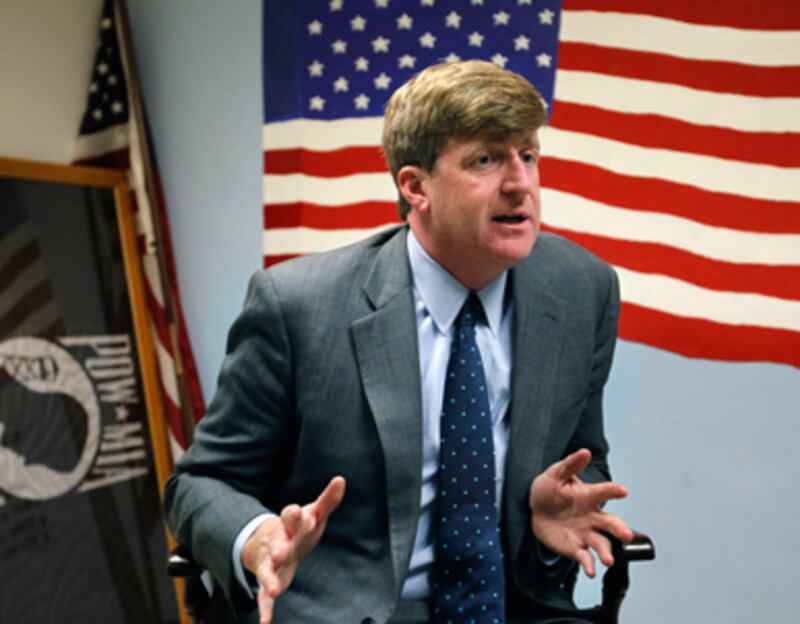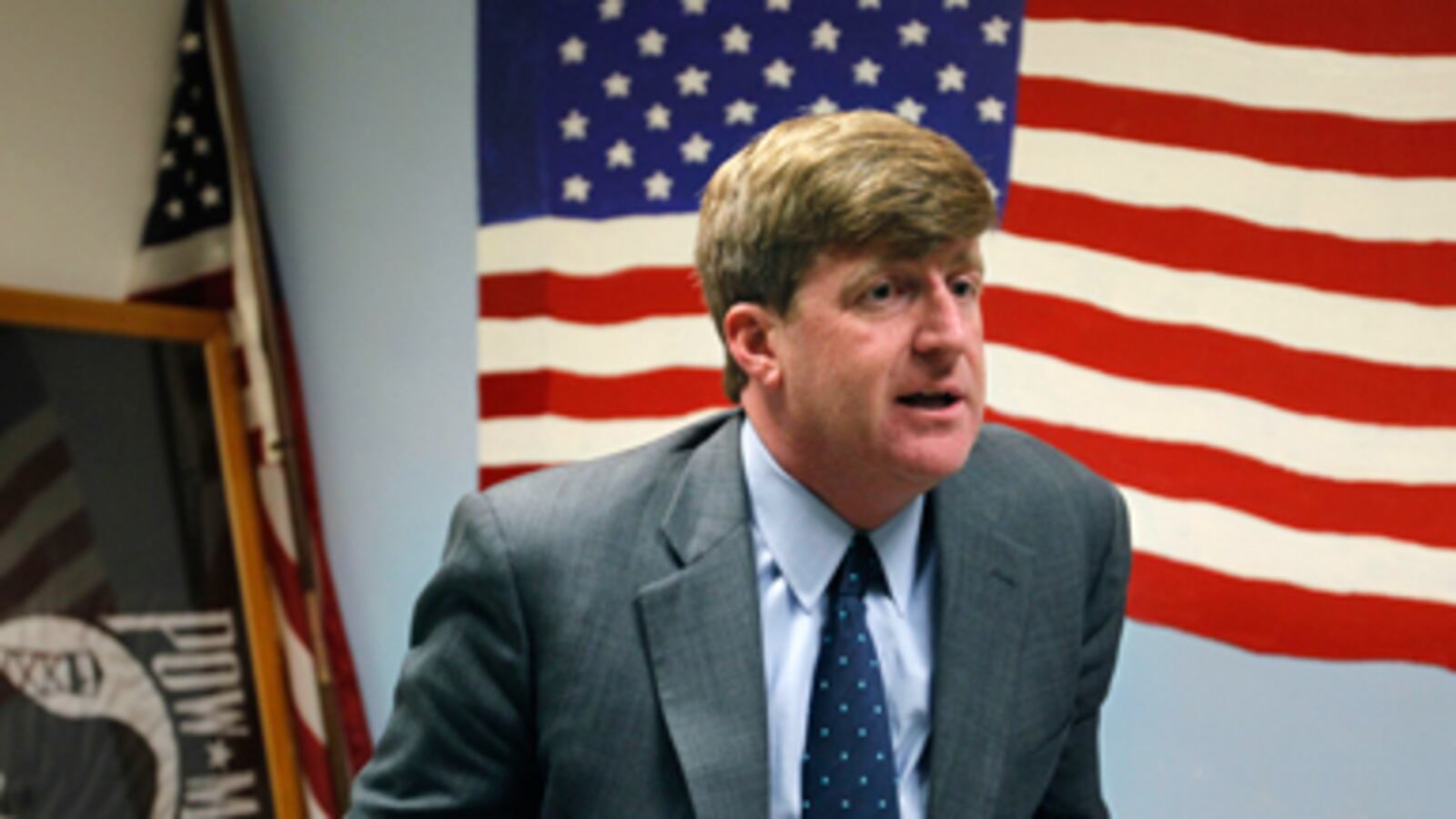In May 2006, it seemed as though Patrick Kennedy hit a proverbial bottom. The nephew of JFK and son of Ted Kennedy had just driven his car into a security barrier on Capitol Hill in a prescription-drug induced haze. The story erupted with controversy and allegations of nepotism: Why wasn’t he given a sobriety test at the time? Why did the police give him a ride home?
A day after the car crash, Kennedy announced that he was heading to rehab for the second time in less than a year to battle his twin demons, depression and substance abuse. The episode played out quite publicly as it became fodder for cable news pundits and late-night comedians who zeroed in on what they saw as his fondness for alcohol. Three years later, Kennedy was back in rehab.

But sometimes positive things can spring from bad experiences—or in Kennedy’s case, a quarter-century struggle with depression, alcoholism, and drug addiction. Realizing that he could use his troubles—and last name—as a platform, he decided to retire from Congress after 16 years of representing Rhode Island to pursue a new goal: promoting brain research. “What I ultimately found was that the very thing that I felt most ashamed about in my life … I could make into an asset and essentially repurpose as a positive,” Kennedy told The Daily Beast.
On Monday, he will launch the One Mind for Research campaign, a 10-year effort that will bring together researchers, policymakers, and philanthropists to study everything from Alzheimer’s to autism to post-traumatic stress disorder (as well as depression and substance abuse). While most research gets categorized by disease, the idea here is to get a better understanding of the brain as a whole so that a breakthrough in Parkinson’s research might help those studying epilepsy. The kickoff event, a meeting of the minds in Boston, was timed to coincide with the 50th anniversary of President John F. Kennedy’s call to land a man on the moon within a decade.
“What I ultimately found was that the very thing that I felt most ashamed about in my life… I could make into an asset and essentially repurpose as a positive,” Kennedy told The Daily Beast.
As the younger Kennedy seeks to rebrand his famous uncle’s space challenge as a “moonshot for the mind,” he’s hoping the campaign will help personalize brain disorders so people are motivated to find treatments. One Mind for Research has also set a hugely ambitious fundraising goal, hoping to secure $5 billion in private donations and steer $10 billion in government funding to neuroscience research over the next decade. They have a long way to go. Since January, Kennedy has collected about $1 million.
While the campaign itself came together relatively quickly, Kennedy’s journey to this point hasn’t been so smooth. Like others who have grown up in the public eye, Kennedy’s mistakes were subject to intense scrutiny. Having such a famous family with its own share of illicit episodes has magnified his issues.
“I grew up feeling like I was a loser,” said Kennedy, 43. “I was unable to pick myself up by my bootstraps and be somebody that was a celebrated success, if you will, because I had debilitating depression and a commensurate battle with addiction in an effort to self-medicate.”
His struggle was not unique. And when he returned to Congress from rehab, Kennedy was greeted by lawmakers on both sides of the aisle who told him of family members that had wrestled with depression or addiction or eating disorders. But few of these colleagues were talking about it publicly. No one really wanted it out in the open because it was considered embarrassing, but they opened up to Kennedy because they knew he had been through it himself. “I might as well have had my branding kind of tattooed on my forehead as someone in recovery who understood the stigma,” he said.
Over the years, there have been a few outspoken proponents of mental health on Capitol Hill aside from Kennedy, who in 2008 helped pass legislation that prevents health-insurance companies from shortchanging mental-health patients. However, despite recent legislative victories, the stigma of mental illness is one that has endured, though the wars in Iraq and Afghanistan are helping to change that. The Veterans Administration estimates that roughly half of the 625,000 Iraq and Afghanistan War vets the department is treating have been diagnosed with a mental illness. The signature wounds of the conflicts—post-traumatic stress disorder and traumatic brain injuries—have drawn considerable media attention, and the general public has rallied around the troops that have put themselves in harm’s way.
That is why the One Mind for Research campaign will focus much of its attention on PTSD and TBI. “Everybody in the country wants to take care of returning veterans and realizes the great sacrifice they've made,” said former Rep. Richard Gephardt, who is informally advising on the project. “We can treat the physical conditions pretty good. We can fix their legs and arms and bodies with modern medical science, but we don’t have much for the brain.”
Relatively little is known about the brain, the most complex human organ. It’s made up of trillions of neurons, all of which do different things. Getting a handle on which neurons contribute to which disease has proven problematic, especially since the brain is notoriously difficult to access. But then there’s also the problem of getting researchers across a variety of disciplines onto the same page. This is where Kennedy might have the biggest advantage.
“I haven't gotten one no,” he said, noting that his family name has helped open doors for this project. “Everybody I go to says yes.”
Laura Colarusso is a reporter at The Daily Beast. She previously worked as a senior news editor at Talking Points Memo. She has also written for The Boston Globe, The Star-Ledger (Newark), AOL and New Jersey Monthly Magazine.






